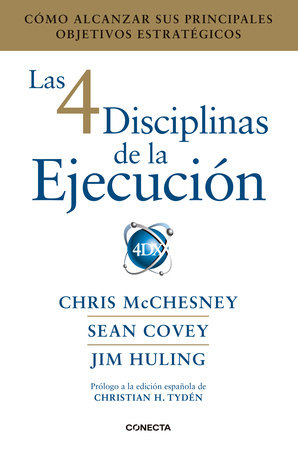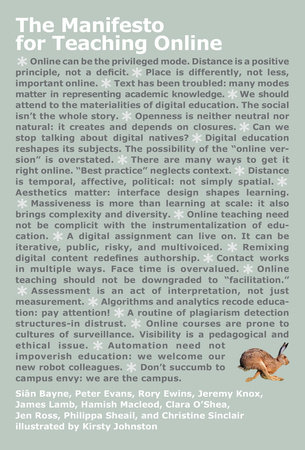

The Manifesto for Teaching Online
By Sian Bayne, Peter Evans, Rory Ewins, Jeremy Knox and James Lamb
By Sian Bayne, Peter Evans, Rory Ewins, Jeremy Knox and James Lamb
By Sian Bayne, Peter Evans, Rory Ewins, Jeremy Knox and James Lamb
By Sian Bayne, Peter Evans, Rory Ewins, Jeremy Knox and James Lamb
Category: Nonfiction
Category: Nonfiction

-
$25.00
Sep 15, 2020 | ISBN 9780262539838
-
Sep 15, 2020 | ISBN 9780262361071
YOU MAY ALSO LIKE

Guns Up!

Madrigal’s Magic Key to Spanish

Mafalda 2 (Spanish Edition)

Las 4 Disciplinas de la Ejecución / The 4 Disciplines of Execution

Japanese – English Bilingual Visual Dictionary

Rethinking Diabetes

Outliers (Fuera de serie) / Outliers: The Story of Success

Mafalda 7 (Spanish Edition)

Soul Coaching Oracle Cards
Praise
“An insightful, engaging and thought-provoking book. The Manifesto for Teaching Online is essential reading for students, researchers and educators wishing to critically reflect on the current status quo in distance education and examine alternative futures.”
—Rebecca Eynon, Associate Professor and Senior Research Fellow, Department of Education and the Oxford Internet Institute, University of Oxford
“This book has few peers, offering practical takeaways but never shying away from asking hard questions about the work of online teaching. The authors push the conversation forward in ways that will change the landscape of online education for the better.”
—Jesse Stommel, Executive Director of Hybrid Pedagogy; cofounder of Digital Pedagogy Lab
“The Edinburgh team have been cutting through the hype of e-learning for the past 15 years. This neat volume is full of ideas and inspiration for any critical educator who wants to move beyond the usual ‘what works?’ cheerleading that continues to dominate ed-tech.”
—Neil Selwyn, Distinguished Research Professor, Monash University
Table Of Contents
Section 1: Politics and instrumental logics
1. There are many ways to get it right online. ‘Best practice’ neglects context.
2. We should attend to the materialities of digital education. The social isn’t the whole story.
3. Online teaching need not be complicit with the instrumentalisation of education.
4. Online teaching should not be downgraded into ‘facilitation’.
5. Can we stop talking about digital natives?
Section 2: Beyond Words
6. Text has been troubled: many modes matter in representing academic knowledge.
7. Aesthetics matter: interface design shapes learning.
8. Remixing digital content redefines authorship.
9. Assessment is an act of interpretation, not just measurement.
10. A digital assignment can live on. It can be iterative, public, risky, and multi-voiced.
Section 3: Re-coding education
11. Openness is neither neutral nor natural: it creates and depends on closures.
12. Massiveness is more than learning at scale: it also brings complexity and diversity.
13. Algorithms and analytics re-code education: pay attention!
14. Automation need not impoverish education: we welcome our new robot colleagues.
Section 4: Face, space and place
15. Online can be the privileged mode. Distance is a positive principle, not a deficit.
16. Contact works in multiple ways. Face-time is over-valued.
17. Place is differently, not less, important online.
18. Distance is temporal, affective, political: not simply spatial.
Section 5: Surveillance and (Dis)trust
19. Online courses are prone to cultures of surveillance. Visibility is a pedagogical and ethical issue.
20. A routine of plagiarism detection structures-in distrust.
21 Books You’ve Been Meaning to Read
Just for joining you’ll get personalized recommendations on your dashboard daily and features only for members.
Find Out More Join Now Sign In










